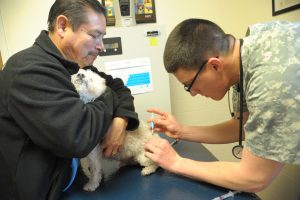Veterinarians warn of canine flu outbreak
By Kelli Duncan For Chronicle Media — May 23, 2016

Pfc. Robin Cornelius, Pubic Health Command, Fort Hood, vaccinates Juan Gomez’s dog, Cody, with the rabies vaccine March 9 at Joint Base San Antonio-Randolph. (U.S. Air Force photo by Joel Martinez)
A recent outbreak of canine influenza virus is nothing to sneeze at, according to a local veterinarian.
Dr. Romanie Walter, veterinarian at the Animal Emergency Clinic in Bloomington and founder of Smart Vet, said that this new outbreak of CIV should be taken very seriously.
Uptown Partners took it seriously enough to cancel this year’s Pooch Parade & Pet Fair — scheduled for May 21 — due to the threat of canine influenza.
Bortell Animal Hospital in Bloomington has confirmed more than 20 cases of the dog flu within the last few weeks.
Walter said she has seen more than 35 cases and has gotten twice as many phone calls from owners describing flu-like symptoms. Walter estimates that more than 1,000 dogs have already been infected in the Bloomington-Normal area.
The canine influenza virus, commonly known as the dog flu, has since spread to the neighboring town of Peoria where there have been only a few cases reported so far.
This year’s outbreak has already infected thousands of dogs in the Chicagoland area and across the Midwest.
According to PetMD, dogs that contract CIV can develop different types of symptoms depending on whether their infection is mild or severe. Dogs with mild canine influenza will have a wet cough and may have nasal discharge. Dogs will often appear lethargic and may have a reduced appetite. These symptoms may vary and can often be very difficult to recognize.
Dogs with severe CIV, however, will show all of these symptoms very quickly and usually develop high fevers. Dogs with severe symptoms should be taken to an emergency animal clinic immediately.
After receiving treatment, most dogs with the dog flu are completely healthy within two to three weeks without any lasting effects. In severe cases, however, Walter said the dog flu can result in pneumonia and even death. But that is a very rare occurrence.
According to Walter, only 4 percent of dogs die from the canine influenza virus. This typically only occurs in older dogs, puppies and dogs with preexisting medical conditions.
Walter said that, in recent studies, the H3N2 strain of the canine influenza has been found among cats and ferrets as well, but cannot be spread to humans.
She advises owners to stay away from dog parks and other places where larger amounts of dogs are common until the current outbreak subsides. She said that this year’s outbreak has gotten much worse because dog owners have not been taking these recommendations seriously.
The canine influenza is primarily spread from nose to nose contact between dogs, but can be spread through human contact with different dogs as well. Much like the flu virus in humans, the H3N2 virus is also airborne meaning that dogs can become ill after simply being in an area where an infected dog has been.
According to a notice provided by VCA Specialty Vets, the canine influenza virus was first discovered in 2004 when the H3N8 strain was found among racing dogs in Florida. There are two known strains of CIV, H3N8 and H3N2, and both are extremely contagious.
The current outbreak that is infecting dogs in Bloomington-Normal and across the Midwest has been identified as the H3N2 strain. The H3N2 strain of the virus was only ever documented among dogs in Korea, China and Thailand until March of 2015 when Chicago saw its first outbreak. Veterinarians are still unsure how this new strain of the virus was brought to Chicago. Last year’s outbreak infected almost 10,000 dogs in the first two months.
A vaccine for the H3N2 strain of CIV was developed last year. In addition to avoiding dog parks and boarding facilities, Walter advises that dog owners have their pets vaccinated for the virus even though it is not immediately effective in protecting dogs from contracting the virus.
“[the] vaccine does not help when there is an outbreak present, because it takes 4-6 weeks for a dog to develop immunity after a vaccine,” said Walter. “So even if we vaccinate a dog today, the vaccine will not protect the dog for six weeks.”
Walter recommends that owners have their dogs vaccinated anyway, especially if they plan on taking them to dog parks, grooming facilities or boarding facilities in the near future.
— Veterinarians warn of canine flu outbreak —



